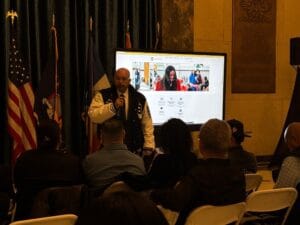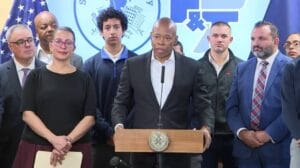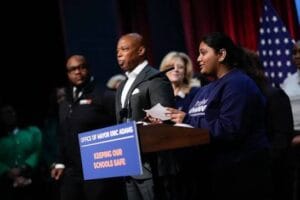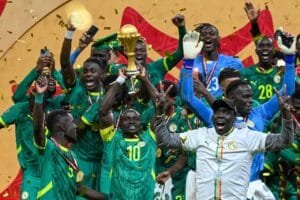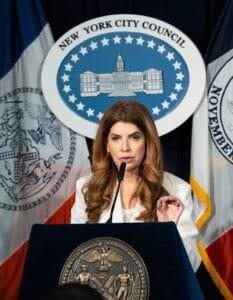The Aftermath (Ch. 1) by Lyn Coffin

The Aftermath can be purchased at Adelaide Books for a 15 percent discount using the code AUTHORSGUEST.
RIDING A STRANGE HORSE
I stood, pulling myself up on a beam of sunlight, using it like a handrail. There was a door in my head, and someone was trying to knock it down.
Bam. Bam. Bam.
I hurt.
I was wearing my gold uniform top but I had buttoned it wrong. I left rebuttoning for later. The misbuttoning went with the jeans being too long. I rolled them up. Up and up. I had big flannel cuffs now. The flannel was red, with big whiplashes of green and black across it. It looked hot and cold at once.
I needed to get home. Where was my skirt? They made you pay for the uniforms yourself.
There was a fifty dollar bill face up on the floor beside a small black cloth purse.
I hurt at the root of me.
I checked. The purse was mine. I recognized my picture on the driver’s license. I was
squinting the way I always do when I know someone is about to take my picture. I looked a lot younger. I tried to put the $50 in the purse. It must have fallen out. Money belonged in a purse. I belonged at home, in a place I wasn’t living any more.
The purse didn’t want to open, but I made it. I put the money where it was safe. The purse didn’t want to close, but it did.
What had happened? No, the way was blocked.
How had I gotten here? That was doable. I worked at the hotel. But employees weren’t supposed to go up to guest rooms. I could be fired. I didn’t need the job, but it wasn’t like me to go directly against the rules: a little slip-sliding” was one thing, flagrant disregard another. But there had been a man, two men, champagne…. I could hear my mother’s voice: “Don’t look back,” she was saying. “People who look back turn to pillars of salt.”
I turned around. Behind me, drifting snow was covering up my tracks. The weather was playing the part of the sweeper character from Alice in Wonderland. I was standing in a present experts said was less than five minutes long. That was part of why I was a good waitress: I was a woman unencumbered by a past. Last night was as far from me as the dark side of the moon. I was safer that way. ”Forgive and forget,” mother had instructed me. But all you had to do was forget, and the forgiveness took care of itself.
There were bed covers mounded up on one side of the mattress. If there was someone under them, the someone wasn’t moving. I hesitated, then pulled off the covers.
Nothing.
My head was knocking again. More like pounding.
There was a real someone, knocking. They were at the room door.
I needed them to go away. I needed them to go away so I could go away.
I walked to the door over a floor that tilted. I remembered to put the chain on. Then I opened the door. A man in white was standing in the hall. He looked familiar. “Do you need a doctor?” he asked.
“Do I look that bad?” I asked. Jokes were good. If you could joke, people thought you were okay. People would let you go.
The man in the white coat laughed, showing his teeth. I closed the door a little farther.
“Some tall guy was going down in the elevator when I was coming up for a delivery. He said there was a woman in here who needed a doctor.”
I tried to focus. I felt dizzy. The power of suggestion. Someone had given up on the door in my head. They were banging on an anvil now.
“Are you a doctor?”
The man in white laughed again—a little too loudly, I thought. “No, ma’am,” he said. He was really only a boy. I thought for a minute of just closing the door. But, no, then he would call someone. They would batter down the door. They would break the chain.
“I thought you were a doctor,” I admitted. “You’re dressed in white. And you said you were here for a delivery.”
“That’s true,” he said, and laughed again. But now it seemed to me his laughter was forced. I’d let the conversation go on too long. He was darting glances past me, into the room.
“I’m just delivering a pizza.” He opened the box, as if in proof. The pizza looked too big for the box. It was pockmarked with pepperoni.
“Nobody ordered this,” I said.
“Do you want it anyway?”
“No.”
“Do you want me to call a doctor?”
“No.”
He cocked his head. I must have spoken too loudly. He looked as though he suspected something.
“I’m the only one here,” I said. “And I don’t need anybody else. I just need to go home.”
I half expected him to tell me to wait where I was. “Okay,” he said cheerfully. “Just call across the street if you need pizza or anything. I’ll make sure it’s hot.”
“I will,” I said. “Thank you.” I closed the door on his smile, and chained it. I counted to twenty, and opened the door on the chain as quietly as I could. I half-expected him not to have moved, but he was gone.
I found my shoes, and I opened the door, and I stepped out into the corridor, and I closed the door behind me, and I walked down the corridor, and I pushed the elevator button. When it came and the doors opened, I rode down to the ground floor, and I walked through the lobby on thick crimson. I was glad I recognized the lobby. It looked like a stage set, with ornate, overstuffed chairs no one ever sat in, and gilt-edged books no one ever read because their pages had been glued together. I was the only person going anywhere. I remembered to turn left to go outside, and I pushed the big glass circle door around like a clock until I was outside in a world newly-lit by sparkling snow, walking back to an apartment that was mine, or had been mine yesterday.
The world had changed, along with the year. I was happy to be going home, even to an apartment I didn’t really have any more. Everything I owned was in boxes. I would have a home later today, which is what tomorrow had turned into. I would have a home with David and Raitlin.
I was tired, and the sidewalk was slippery. All the trees and bushes had turned white. The snow that was still falling was an after-thought, an unnecessary extravagance.
Mine were the first footsteps in the snow, though it must be late in the morning, since the sun was high over the trees. “Don’t drink till the sun is over the yardarm”– my father’s favorite laughless joke. Why was I thinking about my father? I’d had too much to drink last night. I had a hangover to beat all hangovers.
The stiff fabric of the jeans rubbed against my skin and the place where my legs came together. It was like a dry blue tongue. It hurt, but thinking about where you hurt just made the hurt worse, and there was nothing to be done about it, anyway.
I started to fall, but caught myself. I cursed myself for drinking whatever it had been. Champagne, probably. They should call champagne the Midas drink. But if a drink turned everything to gold, you’d die pretty quick. I had christened a ship with champagne once. It wasn’t a real ship, just a little tug or something, which was why they asked a high school kid to do a woman’s job. I’d been picked because someone felt sorry for me. They told me it would be very bad luck if the champagne bottle didn’t break on the first swing.
I was passing some of those trees that looked down instead of up. What did they call those? Weeping, that was it. They looked like women with long hair and long arms and long legs. Marionette dancers with their strings cut. Old dancers: their hair had turned white. My feet were cold. My body ached with a vengeance. Juneau Street was taking a long time.
What had I been thinking about? Oh, yes. The christening champagne bottle had been wrapped in ribbons. Red, white, and blue. I cocked my arm sideways, and gave it my best shot. The bottle exploded.
Later, they said it was a special bottle, filed down all around the inside to make the green glass walls especially thin. To avoid bad luck. They told me, too, there was a crowd of sailors one floor down, under the party, under the christening party, and at the very moment someone gave the signal and I swung, a sailor had swung, too. To avoid bad luck.
It was a lot of work avoiding bad luck.
I sat down on a bench that presented itself. The bench was white. That was to fool you, so you wouldn’t know if there was snow on it or not. There was. There were holes in the wrought iron seat, but the snow hadn’t fallen through.
I should have driven to work. But there was never any parking when I drove to work. They wouldn’t let you park in the hotel’s parking structure. Well, they would. But not for free.
I got up and tried to walk, but it was harder. There was a story I had read in grade school, about a guy with a few matches and he hadn’t been able to start a fire and he had died in the snow. I was like that guy. Only I didn’t have any matches. That was how it was. You gave up smoking to save your life, but then you didn’t have matches or a light, and you died of frostbite and when they did an autopsy, your lungs were white.
Down at the end of the block, a car was coming. It was a chariot, really. It was white, too, like the snow, like the bench, like the world. It was going in the right direction. It had a little bubble on top. It was probably a cab. Other cars didn’t have those bubbles on them, did they? A cab would be good if I had money. Did I have money? Yes. More than $100. I stepped as close as I could to the curb without falling off, and raised my hand to hail the driver.
It wasn’t a cab, though. It said, “Ann Arbor Police Department” on the side. The police car stopped. The driver got out and came around the front of the car. He stood looking at me, not unkindly. He was dressed in blue. Maybe that was to match his eyes, which were bluer than other blues. In a world where delivery boys looked like doctors, what did policemen look like? Was he really a policeman?
He was carrying a gun. Guns were another way people tried to avoid bad luck. Maybe it was wrong to try too hard to avoid bad luck. Maybe when you did that, the luck got worse. Guns were scary, but the policeman seemed nice. There had been a nice policeman when I was young. He put handcuffs on all of us, and laughed when he slid our hands out. “There’s no catching you small fry,” he’d say to us. “I’m going to have to throw you back.”
My mouth was like a drawer of jumbled clothing. I rummaged around in it until I found my voice like a pair of underwear. No, not underwear. I wasn’t wearing underwear. Like socks.
“You’re a policeman, aren’t you?” I said. My voice wasn’t slurry at all. More like fuzzy. Fuzzy wuzzy was a bear.
“Yes,” the man said. “I’m Officer Ferrier of the Ann Arbor Police Department. Are you all right?”
His voice was odd, full of starts and stops, like one of those tapes that people make to speed up and slow down because it’s funny and different.
He handed me a stiff little piece of paper.
“Are you giving me a ticket?” I asked, too smart to answer his question directly. “I thought you were a cab. I didn’t see your uniform at first, through the glass.”
Officer Ferrier of the Ann Arbor Police Department smiled. He had the mixed up hair that people called “salt and pepper.” His face was bulldog saggy. But when he smiled, he looked nice. He had wonderful eyes, bluer than sea or sky, or anything I could think of that was blue. He looked like someone you could go home with safely. Not that I was any judge.
“Have you done anything I should take you in for?” Officer Ferrier asked.
“I think I’m hung over,” I said. “This is only my second time, though. I was only five the first time. It was after Thanksgiving and I threw up, and the school nurse said, ‘I think someone’s had a little too much turkey, don’t you?’ and I said, ‘No. I think someone’s had a little too much champagne.’ It tasted good, but that was the sugar… I don’t know why I’m talking so much.”
Officer Ferrier smiled. “It’s New Year’s,” he said. “You look really cold.”
His smile was even better than I remembered. Like Humphrey Bogart. He should never have let Ingrid fly away. He should have handcuffed her to him when they were in Paris.
I was in the back seat now. I was coming home from the ball in a police car. My fairy godmother would be nonplussed. I was holding something. A business card. It was white with blue letters. “Officer Adam Ferrier,” it said. He was looking at me in the rear view mirror. “Is there anything you want to tell me?” Officer Ferrier asked.
“No,” I said. “Not at the moment.” Had there been an accident? I hurt, but I couldn’t remember. I had a card in my hand. I put the card in my purse.
The police car stopped, and Officer Ferrier opened the door.
We were in front of my apartment building. There were lions on either side of the cracked marble stairs. They’d been worn down in the middle by the traffic of lifetimes. The building bricks were the color of old mustard. They said at college only virgins could hear the marble lions roar. I hadn’t heard them, but that made sense.
I looked at Officer Ferrier. I suddenly understood why he was wearing a uniform—so you could tell him from the others. “You haven’t been following me, have you?” I asked. He looked hurt, and I rushed to do damage control. “No, of course not. My friend’s friend says I have trust issues, but he’s a little suspicious, and he doesn’t really know me. If I have such big trust issues, I don’t think I’d be moving in with two guys, do you? The house used to belong to Davidson of Harley and Davidson. It has a long driveway for testing motorcycles. It’s not the money thing, either, the move, because my father died and left me more than enough of that. But I don’t know how you know where I live.”
The officer smiled again, but the blue of his eyes clouded over, and he looked sad. He looked perpetually sad, actually. I wanted to make him a cup of tea. I would make him a cup of tea and put two squares of a Hershey bar in the saucer. Or maybe marshmallows. No, marshmallows were for hot chocolate.
“You gave me your address so I could drive you home.”
“That was smart of me,” I said. “Do you want to come up for a drink? I don’t mean a drink drink. A cup of peppermint tea? With Hershey squares in the saucer? I hate peppermint, but it’s good for what ails you. It’s a very useful drink, and I think that’s important. It’s more important to be useful than beautiful, I think. I plan to drink a lot of peppermint tea today.”
“I’m on duty,” the man in blue told me. But he smiled again, which is what I’d wanted, I decided—what I’d wanted all along. “Are you sure you’re all right?” he said. That was funny. It was exactly what I wanted to ask him.
“I’ll be fine once I have a bath and don’t look back,” I said, trying to put some energy, some conviction into my words, for his sake. I wanted him to believe me, and people always believed you more if you put emphasis on your words. As a child who mumbled and looked at the floor a lot, I hadn’t understood that. Too bad. If I hadn’t always talked in a monotone, somebody might have believed me, and everything would have been different.
The officer was waiting. He looked worried. I tried to think why I might not be fine. But that was a blind alley that ran smack into a wall. The bricks in the alley were the color of dried blood. I felt like throwing up. I’d had too much to drink. Way too much. I hurt. I should have known better. I was either hung over, or hung out to dry.
“I’ll be okay now that I’m home,” I said. “Everything’s in boxes, but I can take a bath and lie down.” He was still waiting. He seemed like someone who could wait for a long time without losing patience. What had my grandmother said? “In a crisis, be polite.” This seemed like a crisis, somehow, even though nothing was happening. “Would you like to come in?” I asked politely. Then I surprised myself by hoping he’d say yes.
The officer didn’t smile. “Not now,” he said. “You’ve got my card in your purse,” he said. “If you need help, give me a call.”
Somebody needed to do something. I decided to take whatever animal it was by the horns. “Could I ask you why you’re waiting?” I asked.
The officer nodded. “I’m waiting to see you go in,” he said. I understood. He had a problem trusting people, too. He didn’t trust me. I had told him this was where I lived, but I had also said I was moving. Maybe he thought I didn’t look like the kind of person to live here, in this large mustard-colored building with black bars on the windows, guarded by apparently toothless lions. I wasn’t really the kind of person to live here. Mostly old folks lived here. But I was moving. I had told him that, hadn’t I? He should have believed me, but people in his line of work were probably trained to be suspicious. People in his line of work were probably naturally suspicious.
My apartment key was in my purse. It was all by itself. “I don’t have a key to the outside door,” I told the officer. “I think I already turned it in.”
“The door is open,” he said.
“How do you know?”
“I just tried it. What about your apartment door?”
“What about it?”
“Will you be able to get in your apartment without a key?” The officer was standing with his feet apart. He looked planted in the sidewalk, or at least taped to it. When he started to walk, he would pick up giant hunks of concrete and carry them with him. Cement shoes. Wasn’t that what they said about the dead gangsters they threw in the river? That was ridiculous. Nobody threw dead gangsters in the Huron River. It was only three inches deep.
A key. He had asked me about a key. “I have an apartment key,” I told the officer. “You don’t have to be suspicious. See? Here it is. I painted it red with nail polish. I have an inner key, but not an outer key, somehow. No, wait. Even the outer key is here. It’s just on a separate ring, for some reason…. I didn’t turn it in at all. I’ll be fine. Who wouldn’t be fine with two keys?”
Officer Ferrier frowned. “You go on up,” he said. “I’ll wait down here. When you’re in your apartment, I want you to wave and let me know you’re all right. Okay?”
“Waving is definitely okay,” I told him.
The elevator in the lobby was waiting for me like an open mouth. I took the stairs because they could be done one by one. Stairs let you change your mind at any point. You didn’t have to commit yourself.
My apartment door didn’t want to accept the key. At first, I thought they’d already changed the lock. Finally, it opened.
I put the key back in my purse, but didn’t even try to close it, and stepped inside. I locked the door behind me.
The room was empty except for my boxes, and David’s birdtracks picture, which was lying on the floor, unswaddled and unpacked.
I had the feeling I was missing something, but I often had that feeling. That feeling was an integral part of who I was: it was intentional. I closed the door of the apartment behind me, and dumped the contents of my purse on a box. Everything was there. Pen. Wallet with a clutch of plastic cards and some small bills. My driver’s license. A small red plastic comb. A dry cleaning receipt. Officer Ferrier’s card. Some change. And a $50 bill.
But I was not wearing underwear and the jeans I had on weren’t mine. They could never have been mine. They were much too long. They were lined with flannel.
There was something I was supposed to do. I couldn’t remember what it was. I went to the window and looked out. It was starting to snow again—big, wet flakes. David said where he came from in Texas, a blizzard was where the snow didn’t melt before it hit the ground.
Down on the street, a man dressed in blue stood by a white car. Officer Ferrier. I had forgotten about him. After a moment, he looked up. I waved. He waved back. He stood for a moment by his car. I wondered if he was waiting for me to buzz him up. Then he got in his car and drove off.
I was a little disappointed, but I told myself it was just as well. He looked like a nice guy, though.
I started to shiver.
My coat. That’s what was missing. I had left work. I had walked home in the snow without my coat or my hat or my mittens. My grandmother’s ghost would be very disapproving.
No wonder I was shivering.
I went into the bathroom. I ran the water for a hot bath. Then I sat on the toilet for a long time, breathing in the steam, and waiting to pee.
The bath was almost full before I was able to do anything. My pee came in a painful thread, at first, and then a stinging stream.
They said astronauts had such good filtering devices, they could drink their urine.
When I was finished peeing, I stood up. The thought of anything of substance against any part of me was unthinkable. Maybe I could dry myself off with the hair dryer. But I didn’t know where it was. I shook myself, then turned off the bath water.
I stood just inside the bathroom door and took off my clothing. My fingers were thick and clumsy with cold. “Happy New Year,” I told the face in the mirror over the sink, when I was finally naked.
The face in the mirror swung forward, offering the same advice she always did: “Don’t look back.”
“You’re the one looking back,” I told her.
Looking past the face, deep into the slantwise mirror, I caught a glimpse of my
small, knotty pine dresser. Next to it, shoulder to shoulder like stalwart comrades at arms, stood my three moving boxes. One was marked SHOES and CLOTHING; the second, BOOKS; the third, MORE BOOKS [PLUS HAIR DRYER]. Someone had wanted the hair dryer.
I stepped in the bathtub. Good. But the heat of the water made red stockings on my legs. and when I started to lower myself, the water scalded me. I howled. I sat on the edge of the tub and ran cold water. When the water was the same temperature as I was, I eased myself in, and leaned back against the white tiles, liking the feel of that against my head and shoulders. But my right hand kept creeping along the wall, forward and back, completely independent of me, dragging my right arm with it. It occurred to me that I might be on the verge of a breakdown. The thought was a little alarming.
I was cold. I was freezing, actually. But I couldn’t stand the heat.
I didn’t have the heart to thoroughly clean myself. I just lay there and felt warmth come crawling back to me like an animal who’d done wrong and was afraid you wouldn’t forgive it.
When the water got cold, I stood, pulling myself up by the towel rack. Half of the towel rack came out of the wall and the towel fell into the bathtub and got wet and cold. I stepped gingerly out of the tub and used a washcloth to dry off.
I pulled my last unpacked T-shirt and my last pair of unpacked slacks out of the knotty pine dresser and put them on. Luckily, they were soft. Then I kicked the jeans that lay discarded by the tub until they were out in the living room.
Let sleeping dogs lie. Only they didn’t look like a dog as much as the discarded skin of a giant blue snake.
I steered my way across the now trackless living room, avoiding the jeans, and crawled into bed, under the single sheet. I closed my eyes. A white shirt, well-starched, dangled over my mother’s red shoes. An umbrella, black and leaning. Fear, then pain.
It wasn’t until I reached up to pull down the the window shade by my bed that I saw it. Scrawled on my right palm in marker, savage in its thickness, was a red “G.” There was nothing on the other palm.
What did “G” stand for, “God?”
How did it get there?
I was exhausted, but I had to get the “G” off. The letter made my palm burn. I’d been caught red-handed. A was adultery. What was “G”? “G” movies were “General,” as in “Public.”
I spit into my hands, and rubbed them together, hard. Maybe I would start a fire. I rubbed some more. Spit. Rub. Spit. Rub. My whole palm was faintly red. The “G” was a little dimmer. There had been that story in high school about a scientist who found a potion to eliminate his wife’s ugly birthmark, killing her in the process.
High school had been full of stories with unhappy endings.
Now I licked my palm, remembering happy hours tucked into difficult days, hours of cherry popsicles and stick out your tongue. My palm tasted brackish and salty, like bad champagne.
I got up and went to the bathroom. I was having trouble moving. I arrived at the bathroom. Leaning on the sink with one hand, I opened the cabinet, but there was nothing behind the mirror any more. All traces of me were gone. I thought for a moment I was going to fall over. Using the edge of the sink counter, I lowered myself to the floor. I remembered something: I opened up the cabinet under the sink. There was a can of Comet. I reached in and shook the Comet on my palm. As a first grader, I’d swallowed bunches of this once, trying to clean myself from the inside out.
I poured some Comet on my palms and tried to spit on the heap of blue sand. My mouth was dry. I pivoted and pulled myself over to the bathtub. The faucet was trickling as always. You could never shut those things completely off. That was good, this time. I let a few drops fall into my palm, and I made a witch’s paste. A blue paste to rub out a red spot.
I rubbed and rubbed and the G got fainter and my hands were blue and smelled as though I were living underwater in a world of chlorine. I rubbed and rubbed and the G faded until it was only a hint, a suggestion. “For now we see through a glass, darkly. But then face to face.” The psychic had grabbed my hand and I had said No, but David and Raitlin laughed and pushed me forward, and the psychic looked and shook her head and gave me a hug and wouldn’t take any money and closed her booth right after that.
I made it back to the bedroom, but for a moment, I couldn’t make myself touch the bed. The covers were all mounded up and it was as though someone were under there. Someone unable to move. I pulled the covers off and, like the space behind the mirror, there was nothing there. Nothing at all.
I fell asleep, trying to block out the dream I didn’t want by remembering experiments in color. They wrote the word “Yellow” in blue marker, for instance, and they asked people to say the name of the color of the writing. And people had trouble saying the color instead of the name. If “Green” was written in red, you would say green, because that’s what the word told you.
The dream happened anyway. A man and I were riding somewhere fast, side by side, and I didn’t know where he was taking me, except away from home. It was a cold fall day; the trees we were riding under had no leaves. They were like thin, black skeletons, waving stubby arms stiffly, as if signaling us to stop. I was riding bareback, on a strange horse, holding a baby in the crook of one arm; the man had a saddle, and wasn’t carrying anything. I was naked and so was the baby. We were both covered with white, cold-creamy stuff the dream said was “worm mix.” I was having trouble reining in my horse with one hand. I could feel the horse’s hair (and under that, its bones) pressing up sharply, between my legs. I must have been holding the baby too tightly, because it squirted out of my grasp and fell into a ditch of dirty water. I stopped my horse and slid down to the ground. The man stopped, too. I began to tell the man that what had happened wasn’t my fault. I was shivering because I didn’t have any clothes to wear, I said. The horse was hard to ride. The man was going too fast. I didn’t know the way. The baby had been squirming. After I explained myself, I picked up the baby. The baby was cold and gray, and the blue tracings on its limbs, like rivers on a map, let me know it was dead. The baby’s squirting out of my arms and landing in a ditch, the water, the man, the horse, the weather—none of those had killed the baby. As always, the truth of things struck me too late. What had killed the baby were my explanations.
I decided in the dream I would call Officer Ferrier, and turn myself in. I would do time, and feel better.
The Aftermath is a first full length novel from poet and translator Lyn Coffin. It was released by Adelaide Books earlier this year and can be found at this link.



